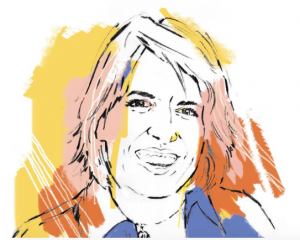The Long Game
 Over an illustrious 30-year career, consultant, author and acclaimed speaker Dinah Bennett has worked with people and organisations all over the world to gain insights into enterprise and entrepreneurship. Her business, International Consultants for Enterprise & Entrepreneurship (ICE), aims to support global financial, academic, commercial and government institutions develop effective enterprise strategies and policy to enable small business communities to become more enterprising. Dinah – who is a fellow of Entrepreneurship at Durham University – is a published author and has been involved in the formation of several organisations, including many in the North East, to encourage more diversity in enterprise. In 2005, Dinah was one the first women to receive the Queen’s Award for Achievement in Enterprise Promotion and in 2009 she was awarded an OBE for Services to Women’s Entrepreneurship.
Over an illustrious 30-year career, consultant, author and acclaimed speaker Dinah Bennett has worked with people and organisations all over the world to gain insights into enterprise and entrepreneurship. Her business, International Consultants for Enterprise & Entrepreneurship (ICE), aims to support global financial, academic, commercial and government institutions develop effective enterprise strategies and policy to enable small business communities to become more enterprising. Dinah – who is a fellow of Entrepreneurship at Durham University – is a published author and has been involved in the formation of several organisations, including many in the North East, to encourage more diversity in enterprise. In 2005, Dinah was one the first women to receive the Queen’s Award for Achievement in Enterprise Promotion and in 2009 she was awarded an OBE for Services to Women’s Entrepreneurship.
PAST
At the beginning of my career, there was a definite focus on start-up, so I concentrated on how to support a growing business, drawing on insights from the research for my Hallmarks book. Challenges to growth tended to be similar, including developing the market and ensuring sufficient cash flow to finance growth, but the environment varied, so solutions had to be contextualised. The political, economic and socio-cultural environment had – and continues to have – a significant impact. The maturity of the business support ecosystem was a critical factor – policy makers and service providers, including banks and other organisations tended to view SMEs essentially from a corporate lens and failed to understand the key characteristics and needs of the sector.
PRESENT
Major changes such as globalisation and digitalisation, the rise of Fintech and artificial intelligence have had a significant impact on the world of work as well as on the SME community. Change has been endemic in most countries, irrespective of their level of development, although priorities and potential solutions differ. In the UK, the focus moved from start-up to hi-tech starts to open innovation to the current emphasis on scalability. Nonetheless, many established SME owners I work with internationally, acknowledge that in many ways, little has changed in the support networks – there still seems to be lack of true understanding of the SME, meaning that many services do not have the expected impact.
FUTURE
Enterprise and entrepreneurship will inevitably become more relevant in the future. It forms part of the mind- and skill-set required to succeed in the gig-economy or as a self-employed person with a portfolio career, in setting up and growing a business or in introducing innovation and responsiveness in the public and corporate sector. Ensuring that these skills are developed throughout the education system is critical. A wider range of diverse role models that highlight the different possible paths of entrepreneurship widens horizons, including encouraging women to enter non-traditional sectors (as I’ve seen in our recent work in Peru and involving established owner-managers in mentoring new businesses). Working with the entrepreneurs on the advisory board of Societal Innovation and Enterprise Forum, their ‘stickiness’ and loyalty to the region is evident, as is the contribution they can make to solving many of society’s challenges. This applies to entrepreneurs globally. Country context will continue to be important in terms of the legal, regulatory and business environment, as will culture and social norms. Working with the Task Force for Women’s Enterprise in Tajikistan has shown how a concerted effort involving all stakeholders can begin to make it easier for women entrepreneurs by exerting pressure on aspects of the environment that are not conducive to entrepreneurship.

Article & images courtesy of: NETime Magazine
